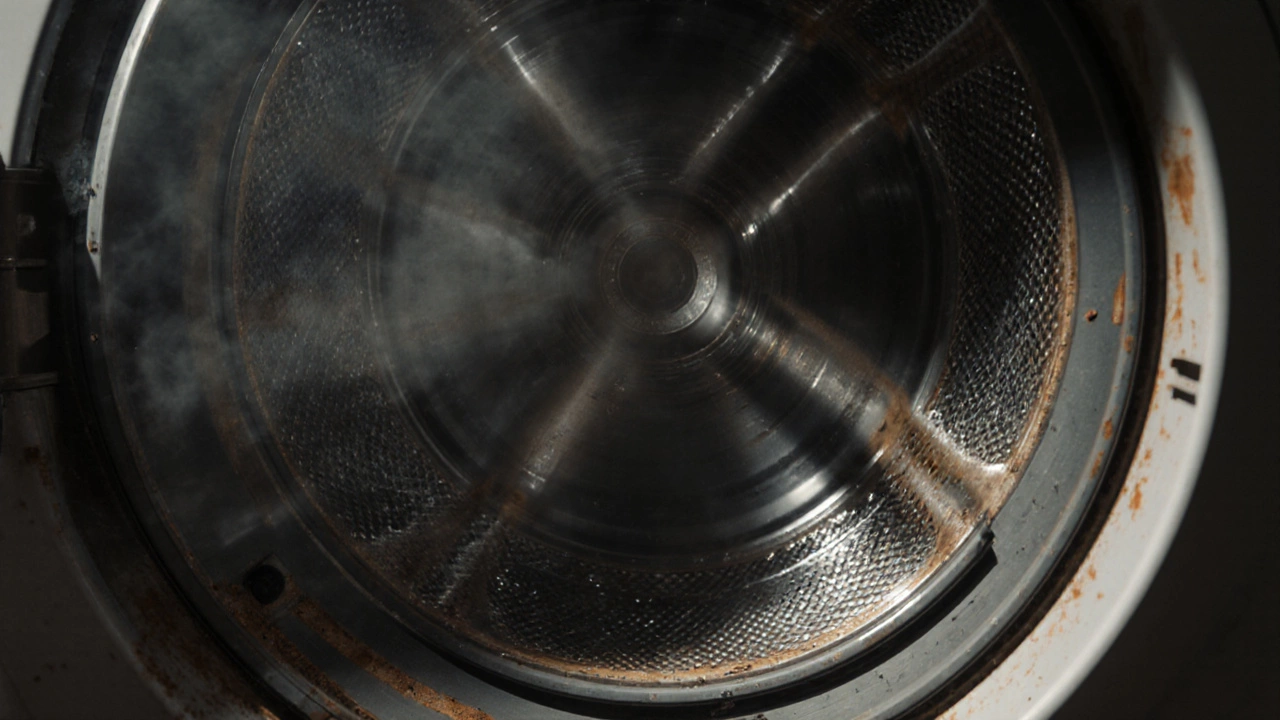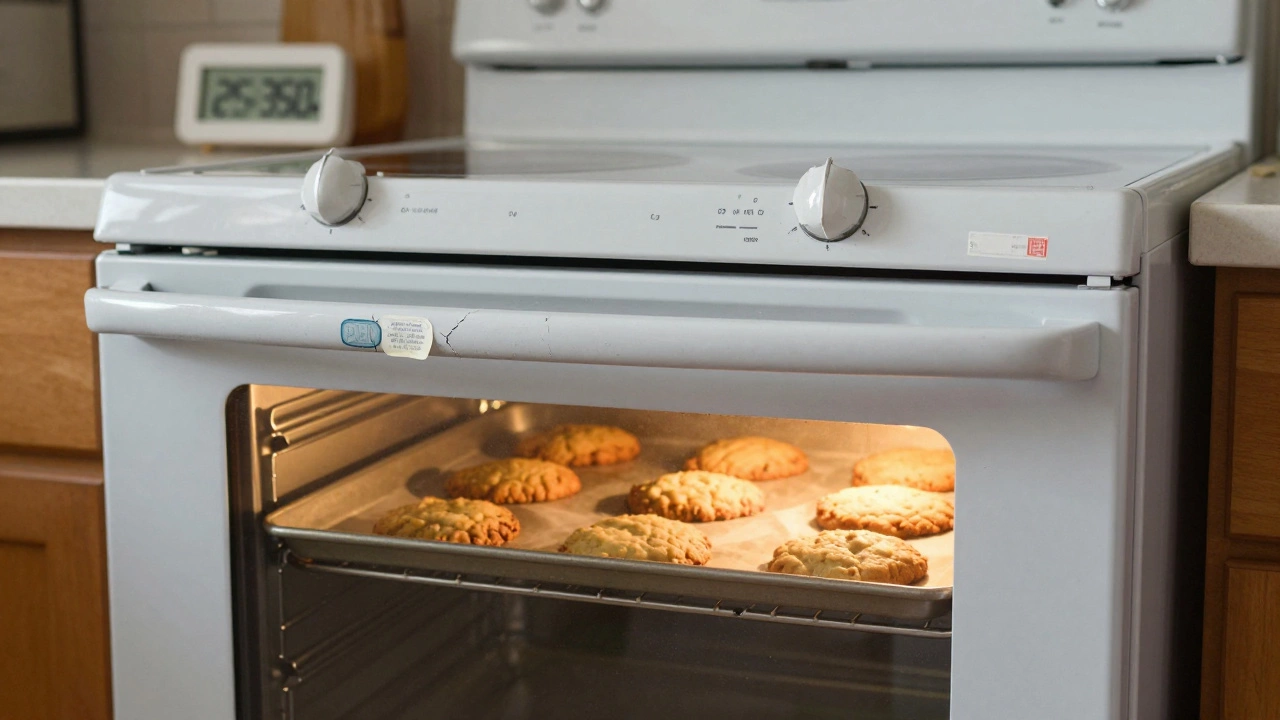
- 8 Jun 2025
- Gideon Thornton
- 0
Washing machines don’t last forever, but their average lifespan might surprise you. Most folks expect a washer to stick around for about a decade, but some can push way past that—especially if you treat them right.
Think your washer’s days are already numbered? Not always. A well-maintained machine, especially some of the old-school models, can chug along for 12 to even 15 years. That’s not just luck. How you use your washer, what loads you run, and a few regular habits make a big difference.
Before you think about replacing yours at the first weird noise, there are real things you can do to stretch out its life (and keep your wallet happy). Let’s clear up what “average lifespan” actually means and what you can do today to make your machine last longer than you’d expect.
- How Many Years Can a Washing Machine Last?
- Brands That Outlast the Rest
- Big Factors That Make or Break Lifespan
- Real-World Tips to Keep Yours Running
- Signs It’s Time to Let Go
- When Repair Is Better Than Replacement
How Many Years Can a Washing Machine Last?
If you ask ten people how long a washing machine should last, you’ll probably get a bunch of different answers. But let’s get real: most modern washers in the U.S. hold on for about 10 to 12 years. Some squeeze out a couple more, while others tap out early. The washing machine lifespan isn’t just random luck—it’s a number that comes from data the appliance industry actually tracks.
The National Association of Home Builders and Consumer Reports both say the average lifespan sits right around 10 years. Front-loaders and top-loaders are close, but front-loaders tend to last a smidge longer if you take care of them. Here’s a quick comparison:
| Washer Type | Average Lifespan (Years) |
|---|---|
| Top-loader (agitator) | 10 |
| Top-loader (impeller/HE) | 11 |
| Front-loader | 11-12 |
Don’t expect your washer to magically run forever once it hits the average. These numbers mean that half the washers made it to that age, and half didn’t. If you like squeezing every last year out of your stuff, keep an eye out for things like rust on the floor pan, funky odors, and noisy spins—these can tell you when your machine’s getting tired.
It’s also worth knowing: heavy use makes a difference. If you run 10 loads a week for a big family, your washer’s clock is basically moving faster than someone who lives alone and does just a couple loads. Kids (like my son Soren, who seems to think mud is a mandatory part of every outfit) definitely push a washer harder.
In short: 10 to 12 years is the sweet spot for most folks, but hitting or even going past that is possible—if you play your cards right. I’ll cover tricks for just that later on.
Brands That Outlast the Rest
Ever heard someone bragging that their washer is still spinning 15 years in? Odds are, it’s not by accident—it probably came from a brand with a serious reputation. Some washing machine brands just last longer, and it’s not only about price or fancy features. It’s about reliability, solid parts, and good old-fashioned build quality.
If you’re curious which brands go the distance, here’s what shows up from real-world numbers and user reports. Consumer Reports and multiple repair surveys show these names again and again near the top:
- Whirlpool: The classic American brand that’s everywhere. Their washers are known for simple controls and easy-to-find replacement parts. Plenty of Whirlpool machines easily hit 12–14 years.
- Maytag: Owned by Whirlpool now, but still known for “built like a tank” engineering. If you want an appliance that’s less fussy, Maytag’s a top choice.
- LG: Modern with loads of tech, but surprisingly reliable. LG’s front-loaders especially seem to rack up high mileage before giving up.
- Speed Queen: The workhorse in laundromats and anyone’s garage who’s serious about clean clothes. These are legendary for durability—Speed Queen machines sometimes keep going for 20 years, especially in home use.
- Bosch and Miele: German brands and a bit pricier, but reviews always mention how their machines keep humming along for a decade or more, even with heavy use.
Check out this quick data snapshot comparing real-life reported lifespans for the big brands:
| Brand | Average Lifespan (Years) | Notable Trait |
|---|---|---|
| Whirlpool | 12–14 | Affordable, easy to repair |
| Maytag | 12–15 | Heavy-duty build |
| LG | 10–13 | High-tech features, reliable |
| Speed Queen | 15–20 | Commercial-grade, legendary durability |
| Bosch | 11–13 | Efficient, solid engineering |
| Miele | 15+ | Premium, can last for decades |
One thing is clear: washing machine lifespan isn’t just a guessing game. Brands actually matter—a lot. If you’re buying a new one, consider it an investment. Grabbing a well-reviewed, long-haul brand really pays off, especially if you plan to keep your machine for more than a few years.
Big Factors That Make or Break Lifespan
The average washing machine lifespan depends a lot on day-to-day stuff. How you treat your washer matters even more than which one you pick at the store.
Water quality is a quiet troublemaker. If your home has hard water, the minerals can mess with the drum and hoses, leading to leaks or a burnt-out heater way before the warranty’s up. Using a water softener or cleaning your machine with vinegar every few months can save you headaches.
Overloading is another killer. Cramming the washer until it’s bursting might seem efficient, but it throws the drum off balance and strains the motor. You want the drum about 3/4 full—enough to swish, but not stuffed. My kid, Soren, once tried to wash all his muddy soccer gear at once. The machine sounded like a helicopter and almost walked right out of the laundry room. Don’t be Soren here.
Detergent choice also counts. That huge puddle of bubbles from using way too much soap? It’s not doing you any favors. Extra detergent leaves a residue, clogs up parts, and can even cause mold. Stick to the measuring lines—yes, even if you’re in a hurry.
- Type of machine: Front-loaders usually last longer with proper care, but they’re more sensitive to gunk buildup. Top-loaders tolerate a bit more abuse, but still need regular TLC.
- Maintenance: Little things make a difference, like cleaning the filter, wiping the door seal, and leaving the door cracked open after a wash to prevent smells.
- Environment: If your washer sits in a freezing garage or unheated basement, cold temperatures can wreck the electronics and hoses over time.
In short, most washers aren’t doomed by factory defects—they’re brought down by daily habits. A bit of attention now can mean years of extra spins before you need to call a repair guy or buy a new machine.

Real-World Tips to Keep Yours Running
It doesn’t take a degree in engineering to keep your washing machine humming for years. Most of us just want it to avoid that dreaded clunk and stop flooding the floor. Here’s what actually works in real homes.
First, don’t overload your washer. Packing it to the brim might seem efficient, but it wrecks the drum and puts serious strain on the motor and bearings. Most manufacturers recommend filling the drum about three-quarters full at most. That sweet spot keeps your clothes spinning freely and eases up on those hard-working machine parts.
Next up, watch what you toss in. Got coins rattling in your jeans? Spare screws from the kid’s pocket? Remove them before you throw the load in. Metal stuff and even too much hair can clog up the drain pump or rip the inside drum. It sounds simple, but you’d be amazed how often repair techs pull out all kinds of junk.
Then there’s the whole detergent thing. Using more soap doesn’t equal cleaner clothes—in fact, it wears out your machine way faster. High-efficiency (HE) washers need HE detergent, and only a small amount. Extra soap leaves residue, which traps odors and messes up the drum and hoses.
- Wipe down the door seal regularly—especially if you have a front loader. Mold and gunk love to hide there.
- Run a hot cleaning cycle with washing machine cleaner or just white vinegar once a month. This helps flush out soap scum and keeps everything smelling fresh.
- Make sure your washer is sitting level. Uneven legs can make the machine shake, which loosens connections and wears parts down quickly.
- Don’t ignore weird noises or error codes—they can be early warnings before something goes haywire.
The folks at Consumer Reports say,
“Routine cleaning and reasonable loads are the easiest ways to make sure your washer lasts as long—or longer—than the average.”
It might sound obvious, but clearing out the lint filter on combo units and cleaning hoses every year or so can stop small issues from becoming expensive disasters. Soren once shoved a whole sock into our washer’s hose (don’t ask why); pulling it out before something burst probably added two years to that machine’s life.
Stick with these habits, and your washing machine lifespan is likely to hit its peak, not bail out early.
Signs It’s Time to Let Go
You can keep a washing machine going for a long time, but eventually, it’ll start dropping hints that its run is pretty much over. Ignoring the signs usually just means more hassle and bigger repair bills later. Here’s how you know it’s actually time to start shopping for a new one.
- Unusual noises or violent shaking: If your washer sounds like it’s prepping for lift-off every time it spins or shakes the whole room, that’s usually a bad sign—especially if it still happens after balancing the load and adjusting the legs.
- Constant breakdowns: When you’re on a first-name basis with your repair guy, it’s time to do the math. Experts say repairs shouldn’t cost more than half the price of buying new. If they do, move on.
- Leaks that keep coming back: One leak can be an easy fix, but leaks that keep showing up mean something deeper is wrong. And constant water under the machine can destroy floors fast.
- Electrical problems: Flickering lights, weird burning smells, or tripped breakers are red flags. Don’t ignore electrical issues—these can be dangerous.
- It’s over 12 years old: Once that age hits, any big repair is usually money down the drain. The odds of failure shoot up fast past the ten-year mark.
- Laundry isn’t getting clean: If you’re washing socks two or three times and they still stink, the agitating mechanism might be on its way out.
Take a look at the numbers below. They show roughly when most washers start dropping off, based on real-world repair data.
| Washer Age (years) | % Needing Major Repairs |
|---|---|
| 0-5 | 5% |
| 6-10 | 14% |
| 11-15 | 36% |
| 16+ | 59% |
If a repair tech tells you something major like the drum, control board, or motor is shot—and your machine is already up there in age—it makes way more sense to put that money toward a new one. Sometimes you just have to let the old washer go and move on to something more reliable.
Remember, spotting these warning signs early can help you avoid total disaster (and a ruined laundry day).
When Repair Is Better Than Replacement
Don’t rush to toss your old washer just because it’s acting up. Sometimes a quick fix is all you need—and it’ll save you a chunk of cash over buying new. Here’s the deal: If your machine is less than ten years old and repairs are cheap, fixing it is usually smarter than splurging on a new one.
Let’s look at some numbers. The average repair for a washing machine in 2024 cost around $250, but a brand-new, decent-quality washer? That’s closer to $700 or more. If the fix is less than half the price of a replacement and your washer isn’t ancient, it makes sense to keep the old one rolling.
| Age of Washer | Average Repair Cost | New Washer Cost |
|---|---|---|
| 3-5 years | $150 | $650 |
| 6-10 years | $250 | $700 |
| 11-15 years | $400+ | $750 |
Here's when a repair is usually the way to go:
- The problem is simple—like a worn-out belt, sensor, or drain pump.
- Parts are easy to find and not overpriced.
- Your washer hasn’t had major breakdowns before (one-off repairs are fine, but a broken part every month is a bad sign).
- The model is known for lasting long after small repairs—some Whirlpool and Maytag washers, for example, are famous for this.
But if your machine is showing its age or needs repairs close to what a new model costs, replacement might be smarter. Here’s a quick test—the so-called “50% rule”: If repairing costs more than 50% of the price of a new machine and your washer is halfway through its washing machine lifespan, think hard about just getting a new one.
One last tip from my own experience: sometimes it pays to call a local repair shop and just ask for an honest opinion. There’s no harm in getting a second look before making a big decision, and the right fix can add years of clean clothes without emptying your savings.



